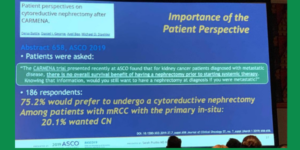The theme for this year’s ASCO (American Society of Clinical Oncology) annual meeting was Caring for Every Patient, Learning from Every Patient. This theme perfectly represents what the meeting is all about. Researchers, doctors and industry from around the world coming together to improve the lives of cancer patients. Interestingly this meeting is not attended by patients, but instead Patient Advocates attend to share the voice of the patient. This was my first year attending, and I am happy to report back to you the ‘buzz’ on what is happening with kidney cancer research and treatment. First up, immunotherapy based combination therapies.
Immunotherapy Based Combination Therapies – Presented by Rana McKay, MD, Medical Oncologist, UCSD
IO (immunotherapy) based combinations are now the standard of care in the US for first line treatment of advanced RCC. Dr. McKay shared that the approved combinations have resulted in the strongest responses to date for a subset of patients with advanced RCC! If you are newly diagnosed with advanced RCC and have not started any type of systemic therapy yet, these are the treatment combinations that you can discuss with your doctor.
Note – results shared below are from the individual trials for these combinations. These combinations were not tested to see how they compare to each other. You can learn more about all approved treatments in the US here.

Objective Response Rate (ORR) is the proportion of patients with tumor size reduction of a predefined amount and for a minimum time period. This is a key metric tracked during clinical trials.
Nivolumab (Opdivo) + ipilimumab (Yervoy) – both immunotherapy. ORR ranged from 41% to 58%
Pembrolizumab (Keytruda) + axitinib (Inlyta) – this is an IO/TKI combination. ORR of 59.3%
Avelumab (Bavencio) + axitinib (Inlyta) – Also an IO/TKI combination. ORR ranged from 51% to 55%
Emerging Standards for Advanced Kidney Cancer – Chaired by James Brugarolas, MD, PHD, with panel members Primo Lara, MD, Elizabeth Plimack, MD and Brian Rini, MD
In addition to systemic treatments like IO combinations, this session included highlights on the successful use of radiation to treat RCC.
- When there is spread to the brain, stereotactic radiosurgery (SRS) is preferred over whole brain radiation (WBR). SRS is a non-surgical radiation therapy used to treat small tumors of the brain.
- Oligometastatic disease and local therapies – Oligometastatic disease is when the cancer has formed a small number of tumors in only one or two other parts of the body. Treatment approaches discussed were stereotactic body radiation therapy (SBRT) and surgery. SBRT delivers intense doses of radiation to cancer cells while minimizing damage to healthy tissue. For surgery, the option of cytoreductive nephrectomy was discussed.
Nephrectomy, Metastatectomy and Cytoreductive Nephrectomy With Modern Immunotherapy and Combinations – Chaired by Bradley McGregor, MD with panel members Sarah Psutka, MD and Robert Uzzo, MD, FACS
Discussion that early systemic treatment remains standard for metastatic RCC, but with new therapies surgery can be done with minimal interruption to that therapy. Studies are taking a closer look at best ways to combine systemic therapy with metastasectomy (surgical removal of metastases, which are secondary cancerous growths that have spread from cancer originating in another organ in the body). The evolving use of cytoreductive nephrectomy was also discussed.
A thank you goes out to the members of our KCCure communities that responded to last year’s survey on patient views of cytoreductive nephrectomy. The importance of the patient perspective, your perspective, was highlighted in the session. 74% of those that responded to they survery wanted a cytoreductive nephrectomy. Full results of the survey can be viewed here.
There is far more information presented at ASCO than can be summarized in one article. If you are a kidney cancer patient, know you have treatment options, and many people are hard at work to continue to make them better.


